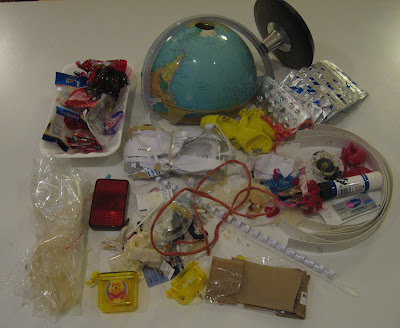
I see that the latest edition of Cambridge Matters includes an article on our zero waste challenge, and mentioned this blog. This seems a good opportunity to look back and consider what we learned from the experience.
Although like most people my initial reaction to the idea of 'zero waste' was of course to question even trying to do something I knew could not be done. However, the exercise proved immensely valuable If you are aiming for an empty black bin, then every little bit of waste is subject to scrutiny. This soon got me into some good habits that have stuck ever since.
Firstly, I thought I was doing well if I tore window envelopes in half and put the bit containing the window in the black bin. The zero waste challenge meant that I had to cut out the window itself, with everything else going in the green bin. Similarly the card packaging with windows, the cotton cushion covers with zips, the old wood with nails.
Before the challenge I tended to look at a piece of rubbish and put it in the black bin if it couldn't be recycled. Now I am in the habit of breaking it up into component parts and there is no doubt our black bin is so slim it could feature on a fashion catwalk!

The other good habit I learned was to routinely wash meat packaging. When I knew it was going to be hanging about in the porch for a month, I washed it all carefully to avoid smells and the notorous maggots. Now I find even a quick rinse with the end of the washing up water makes a lot of difference, and why should our binmen have to work in a malodorous cloud, after all?
When we met up at the end of the month (see photo), it was surprising how little rubbish there was from four households. Since then, we have been able to recycle metallised drink cartons and batteries as well.

Although like most people my initial reaction to the idea of 'zero waste' was of course to question even trying to do something I knew could not be done. However, the exercise proved immensely valuable If you are aiming for an empty black bin, then every little bit of waste is subject to scrutiny. This soon got me into some good habits that have stuck ever since.
Firstly, I thought I was doing well if I tore window envelopes in half and put the bit containing the window in the black bin. The zero waste challenge meant that I had to cut out the window itself, with everything else going in the green bin. Similarly the card packaging with windows, the cotton cushion covers with zips, the old wood with nails.
Before the challenge I tended to look at a piece of rubbish and put it in the black bin if it couldn't be recycled. Now I am in the habit of breaking it up into component parts and there is no doubt our black bin is so slim it could feature on a fashion catwalk!

The other good habit I learned was to routinely wash meat packaging. When I knew it was going to be hanging about in the porch for a month, I washed it all carefully to avoid smells and the notorous maggots. Now I find even a quick rinse with the end of the washing up water makes a lot of difference, and why should our binmen have to work in a malodorous cloud, after all?
When we met up at the end of the month (see photo), it was surprising how little rubbish there was from four households. Since then, we have been able to recycle metallised drink cartons and batteries as well.
We know that there is a long way to go, both as Cambridge residents and city councillors. We need to design ways for people who live in flats to be able to recycle properly. We need to persuade more people that it is worth effort to avoid more precious land being used for landfill.
Perhaps if more residents were to join the trips to look round our waste site at Donarbon, they would see how much better it is to put their rubbish in the corporate compost heap (right) which can be used for farming, parks and gardens, rather than going in a hole in the ground (below) for eternity...........














